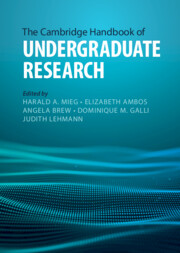Book contents
- The Cambridge Handbook of Undergraduate Research
- The Cambridge Handbook of Undergraduate Research
- Copyright page
- Contents
- Figures
- Tables
- Contributors
- Foreword
- Foreword
- 1 Introduction
- Part I Theory and Research on Undergraduate Research
- Part II Implementation, Approaches, Methods
- 7 Introduction
- Part II.1 Implementation Models in Undergraduate Research
- 8 The Zurich Framework
- 9 Four-Component Instructional Design Model, Maastricht
- 10 Connected Curriculum, UCL
- 11 Humboldt Reloaded, Hohenheim
- 12 The US Model at IUPUI
- Part II.2 Key Measures for the Implementation of Undergraduate Research
- Part III Disciplines
- Part IV International Perspective
- Part V Avenues for Developing Undergraduate Research
- Index
- References
10 - Connected Curriculum, UCL
from Part II.1 - Implementation Models in Undergraduate Research
Published online by Cambridge University Press: 11 August 2022
- The Cambridge Handbook of Undergraduate Research
- The Cambridge Handbook of Undergraduate Research
- Copyright page
- Contents
- Figures
- Tables
- Contributors
- Foreword
- Foreword
- 1 Introduction
- Part I Theory and Research on Undergraduate Research
- Part II Implementation, Approaches, Methods
- 7 Introduction
- Part II.1 Implementation Models in Undergraduate Research
- 8 The Zurich Framework
- 9 Four-Component Instructional Design Model, Maastricht
- 10 Connected Curriculum, UCL
- 11 Humboldt Reloaded, Hohenheim
- 12 The US Model at IUPUI
- Part II.2 Key Measures for the Implementation of Undergraduate Research
- Part III Disciplines
- Part IV International Perspective
- Part V Avenues for Developing Undergraduate Research
- Index
- References
Summary
University College London (UCL) is a UK ‘research-intensive’ university with a large undergraduate population. Our aim is to connect world-leading research with world-leading education, and we have achieved this by implementing a Connected Curriculum for Research-Based Education. We focus on the role played by educational developers in joining research with undergraduate education. We discuss different spheres of activity within the Connected Curriculum and show how the process brought different communities together and sparked relationships between fields such as student partnership and quality assurance that had hitherto remained separate. Most significantly, own sense of identity changed as we moved from a more traditional role where our work was almost exclusively with colleagues who taught students, to a more creative position working in partnership with a wider network of colleagues and communities.
Keywords
- Type
- Chapter
- Information
- The Cambridge Handbook of Undergraduate Research , pp. 108 - 114Publisher: Cambridge University PressPrint publication year: 2022

